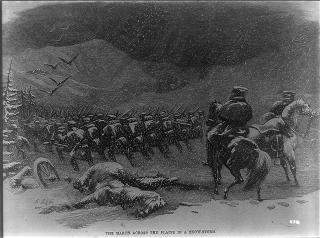Current Research Projects
The March across the Plains in a Snow Storm [Gen. Albert Johnston's march to Camp Scott, Utah Territory -- troops]

U. S. Troops Marching Toward Utah Territory, 1858, Illus. in: Harper's Weekly, v. 2, (1858 April 24), p. 265.
The first project is "A Strange System of Terrorism": Federal Power and the Fraying of Democracy in Utah, Washington, and Kansas Territories in the 1850s. In April 1858, President James Buchanan proclaimed that a “strange system of terrorism” reigned in Utah Territory. Residents had become so alienated from the government that no one could “express an opinion favorable to the government, or even propose to obey its laws, without exposing his life and property to peril.” Thus, federal forces would put down a “rebellion” against the United States, one involving residents in “the guilt of treason.” The president carefully noted that this was not a “crusade against your religion,” but rather necessary to enforce the rule of law. Buchanan’s descriptors—terrorism, peril, rebellion, guilt, treason, crusade—aptly reflect the heightened stakes on the frontier, especially since Utah was not the only area of disruption. Two other territories created in the 1850s, Washington and Kansas, also contributed to a decade of territorial disorder which increasingly demanded federal action. My comparative history of these three territories will engage with two central themes: terrorism and how issues of race, religion, and ideology shaped residents’ understanding of the threats they faced and the government’s response. Although these three territories’ growing pains may seem irrelevant to contemporary national policy, in fact, their history imparts crucial lessons. The United States is now engaged in nation-building around the world while simultaneously fighting a global war on terror. The situation in the 1850s was remarkably similar as the nation was expanding its political system across the continent while disaffected individuals reacted violently to perceived threats. As we combat modern terrorism, it is essential to comprehend how the federal government confronted terrorism on its own continent at a time when the country itself was divided by vast religious, ideological, and racial differences. My study of Utah, Washington, and Kansas Territories will contribute to the policy discussion by providing a historical context for our current, global challenges.
My second project, The Expansionist Impulse: Public Opinion and Antebellum Southern Expansion, is an investigation of public opinion and support for Southern expansion prior to the American Civil War. It builds on the article I wrote on a treaty the United States Senate rejected in 1859 which would have allowed for an American intervention (a take over, more accurately) of the Tehuantepec isthmus of Mexico. Although expectations are that Northern animus toward the potential expansion of slavery derailed the treaty, it actually failed due to a lack of Southern support. See Pearl T. Ponce, “‘As Dead as Julius Caesar’: The McLane-Ocampo Treaty,” Civil War History, vol. 53, n. 4 (December 2007), pp. 342-378. Many of the issues that I raised in that article will be fleshed out in the larger work.

